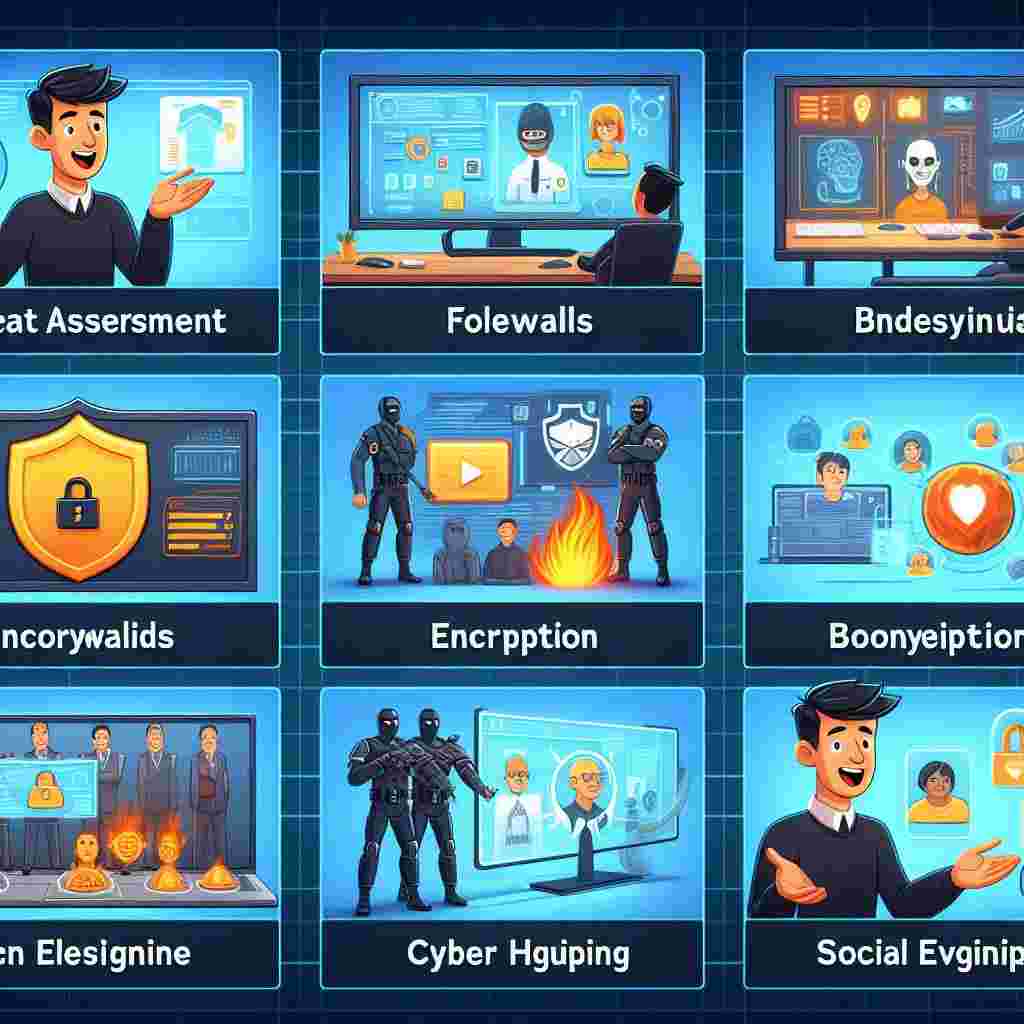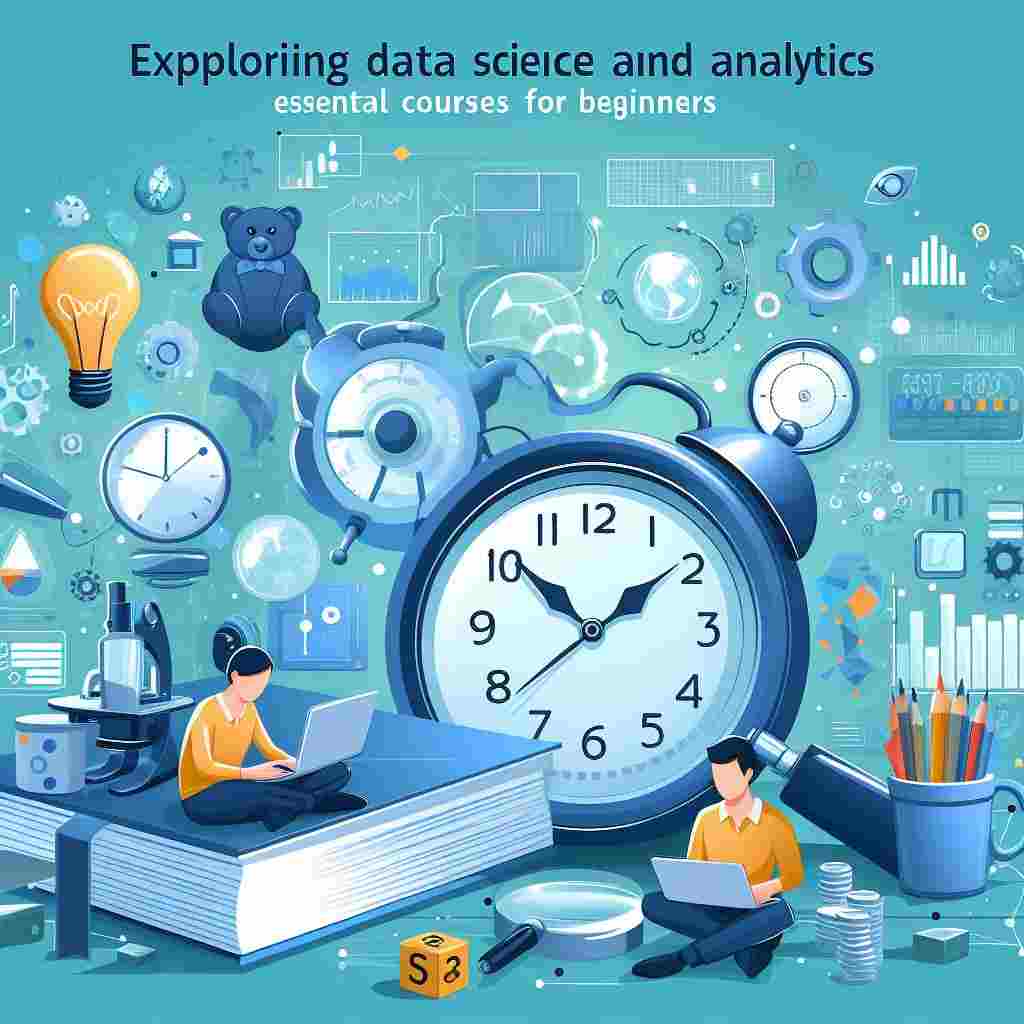Information Technology Courses for Beginners
Are you prepared to immerse yourself in the dynamic realm of Information Technology (IT)? As technology continues to evolve at a rapid pace, the demand for skilled IT professionals remains high. Whether you have recently graduated, are considering a career change, or simply want to expand your skill set, embarking on IT courses for beginners is a promising step towards a fulfilling career path. In this guide, we will explore a selection of top IT courses specifically designed for beginners, aimed at equipping you with the essential knowledge and skills required in the field of technology.
Introduction to Computer Science
This foundational course serves as a gateway to the world of IT, offering a comprehensive overview of fundamental concepts such as programming languages, algorithms, and data structures. Through engaging hands-on exercises and projects, beginners gain practical experience in problem-solving and logical thinking, both of which are crucial skills for any IT professional.
Web Development
In today’s digital age, web development skills are highly sought after. Beginners can start with courses that cover HTML, CSS, and JavaScript, which are the building blocks of web development. By acquiring these skills, you will learn how to create and design websites, laying a solid foundation for a career in web development or design.
Introduction to Cybersecurity
With the increasing frequency of cyber threats, cybersecurity has become a critical aspect of IT. Beginners can enroll in introductory courses that delve into cybersecurity principles, threat detection, and prevention strategies. Understanding the fundamentals of cybersecurity is essential for safeguarding digital assets and infrastructure in any organization.
Networking Fundamentals
Networking forms the backbone of modern IT infrastructure, making it crucial for beginners to grasp the fundamentals of networking. Courses covering topics such as TCP/IP, network protocols, and network security provide a solid foundation for aspiring network administrators or engineers.
Data Science and Analytics
In the era of big data, proficiency in data science and analytics is highly valued across industries. Beginners can explore courses that introduce them to data analysis techniques, statistical concepts, and data visualization tools. With these skills, you’ll be equipped to derive valuable insights from data sets, driving informed decision-making within organizations.
Cloud Computing
has transformed how enterprises function, providing them with the advantages of scalability, flexibility, and cost-effectiveness. Novices have the option to enroll in courses that elucidate cloud concepts, as well as familiarize themselves with platforms like Amazon Web Services (AWS) or Microsoft Azure, and various cloud deployment models. Proficiency in cloud computing is becoming increasingly desirable for employers who aim to modernize their IT infrastructure.
Embarking on IT courses for novices is an exciting journey filled with opportunities for growth and learning. By investing in foundational courses covering key areas such as computer science, cybersecurity, networking, web development, data science, and cloud computing, beginners can lay a solid groundwork for a successful career in Information Technology. Whether you’re aiming to become a developer, analyst, or system administrator, acquiring these essential skills will set you on the path to success in the dynamic world of IT.
Introduction to Computer Science: A Must for Beginners

Are you interested in diving into the fascinating realm of computer science? Whether you have a passion for technology, are considering a career change, or simply want to explore the inner workings of computers, embarking on an Introduction to Computer Science course is an excellent first step. In this article, we will discuss the importance of Introduction to Computer Science courses for beginners and highlight the key concepts you will encounter during your learning journey.
Why Opt for an Introduction to Computer Science Course?
An Introduction to Computer Science course serves as a gateway to comprehending the fundamental principles of computing. It equips beginners with a solid understanding of core concepts such as algorithms, programming languages, data structures, and problem-solving techniques. By enrolling in such a course, beginners gain valuable insights into how computers operate and develop essential skills that lay the foundation for further exploration in the field of computer science.
Key Concepts Explored in Introduction to Computer Science Courses
- Programming Fundamentals: Introduction to Computer Science courses typically commence by covering programming fundamentals. Beginners learn the basics of programming languages like Python, Java, or C++, including syntax, variables, loops, and functions. Through hands-on exercises and projects, students acquire practical experience in writing code to solve problems, establishing a strong groundwork for more advanced programming concepts.
- Algorithms and Data Structures: A thorough understanding of algorithms and data structures is of utmost importance in the field of computer science. These fundamental concepts serve as the building blocks for efficient problem-solving and software development. Beginner-level Introduction to Computer Science courses aim to familiarize students with various algorithms and data structures, equipping them with the skills to analyze problems and devise effective solutions.
- Computer Architecture: In addition to algorithms and data structures, beginners also delve into the realm of computer architecture. This entails comprehending the components and organization of a computer system. The curriculum may cover topics such as the CPU, memory, storage, input/output devices, and assembly language programming. Gaining a solid understanding of computer architecture provides valuable insights into the interaction between software and hardware, which is essential knowledge for aspiring computer scientists.
- Software Engineering Principles: Introduction to Computer Science courses also touch upon software engineering principles. These principles encompass software development methodologies, version control systems, and software testing techniques. By familiarizing themselves with these concepts, beginners are prepared for collaborative software development environments and learn best practices for writing maintainable and scalable code.
Introduction to Computer Science courses serve as a crucial foundation for beginners venturing into the field of computer science. These courses provide a comprehensive introduction to programming, algorithms, computer architecture, and software engineering principles. By acquiring these skills and knowledge, students are equipped to pursue further studies or careers in technology-related fields, whether it be software development, data science, or cybersecurity. Embarking on an Introduction to Computer Science course is an essential initial step towards mastering the captivating world of computing.
Exploring Introduction to Web Development: Ideal Courses for Beginners

Are you eager to dive into the captivating realm of web development? Whether you’re a budding programmer, a creative mind, or someone with a passion for technology, embarking on an Introduction to Web Development course is an excellent way to kickstart your journey. In this article, we’ll delve into why Introduction to Web Development courses are perfect for beginners and outline the key concepts you’ll encounter as you begin your exploration into the world of web development.
Why Opt for Introduction to Web Development Courses?
Introduction to Web Development courses offer beginners a comprehensive introduction to the essential concepts and tools used in creating websites and web applications. These courses cater to individuals with little to no prior experience in coding or web development, making them ideal for beginners looking to acquire foundational skills in this field. By enrolling in such courses, beginners gain practical knowledge and hands-on experience that forms the basis for further advancement in web development.
Key Concepts Covered in Introduction to Web Development Courses
- HTML (Hypertext Markup Language): Introduction to Web Development courses typically start by covering HTML, the standard markup language used to create the structure and content of web pages. Beginners learn about HTML tags, elements, and attributes, enabling them to create well-structured and semantically meaningful web pages.
- CSS (Cascading Style Sheets): Alongside HTML, Introduction to Web Development courses introduce beginners to CSS, the style sheet language used to enhance the visual presentation of web pages. Students learn how to style HTML elements, manipulate layout and typography, and create responsive designs that adapt to different screen sizes and devices.
- CSS (Cascading Style Sheets): Alongside HTML, Introduction to Web Development courses introduce beginners to CSS, the style sheet language used to enhance the visual presentation of web pages. Students learn how to style HTML elements, manipulate layout and typography, and create responsive designs that adapt to different screen sizes and devices.
- CSS (Cascading Style Sheets): Alongside HTML, Introduction to Web Development courses introduce beginners to CSS, the style sheet language used to enhance the visual presentation of web pages. Students learn how to style HTML elements, manipulate layout and typography, and create responsive designs that adapt to different screen sizes and devices.
Introduction to Web Development courses are an ideal starting point for beginners interested in learning web development. These courses provide a solid foundation in HTML, CSS, JavaScript, and responsive design, empowering beginners to create functional and visually appealing websites. Whether you’re aiming to pursue a career in web development, start your web-based project, or simply expand your skill set, an Introduction to Web Development course is the perfect way to begin your journey into the exciting world of web development.
Unveiling the Essentials: Introduction to Cybersecurity Courses for Beginners

Are you intrigued by the ever-growing importance of cybersecurity in today’s digital landscape? Whether you’re a tech enthusiast, a recent graduate, or someone looking to pivot into a rewarding career path, diving into Introduction to Cybersecurity courses for beginners is a prudent step. In this article, we’ll explore why these courses are indispensable for newcomers and highlight key concepts that lay the groundwork for a successful journey into the realm of cybersecurity.
Why Opt for Introduction to Cybersecurity Courses?
Introduction to Cybersecurity courses are tailored specifically for beginners, providing them with a solid understanding of the fundamental principles and practices in cybersecurity. These courses cater to individuals with varying levels of technical expertise, making them accessible to anyone interested in safeguarding digital assets and privacy. By enrolling in such courses, beginners gain invaluable knowledge and skills that are increasingly in demand across industries.
Key Concepts Covered in Introduction to Cybersecurity Courses
- Cyber Threat Landscape: Introduction to Cybersecurity courses often begin by exploring the cyber threat landscape, including common types of cyber threats, attack vectors, and threat actors. Beginners learn to identify potential risks and vulnerabilities in digital systems, laying the groundwork for developing effective cybersecurity strategies.
- Security Fundamentals: Understanding security fundamentals is essential for beginners diving into cybersecurity. These courses cover topics such as confidentiality, integrity, and availability, commonly known as the CIA triad. Students learn about encryption, access control mechanisms, and other security measures designed to protect data and resources from unauthorized access or modification.
- Network Security: Network security is a critical aspect of cybersecurity, focusing on protecting the integrity and privacy of data transmitted over networks. Introduction to Cybersecurity courses introduces beginners to network security concepts such as firewalls, intrusion detection systems (IDS), and virtual private networks (VPN). Students learn how to detect and mitigate network-based threats, safeguarding communication channels from potential attackers.
- Incident Response: In the event of a cybersecurity incident, effective incident response is crucial for minimizing damage and restoring normal operations. Introduction to Cybersecurity courses familiarize beginners with incident response procedures, including incident detection, analysis, containment, eradication, and recovery. Students gain practical experience through simulated scenarios, preparing them to handle real-world cybersecurity incidents effectively.
Introduction to Cybersecurity courses for beginners is essential for anyone looking to embark on a journey into the dynamic field of cybersecurity. These courses provide a comprehensive introduction to key concepts such as the cyber threat landscape, security fundamentals, network security, and incident response. Whether you’re aspiring to become a cybersecurity professional, enhance your organization’s security posture, or simply bolster your cybersecurity awareness, enrolling in an Introduction to Cybersecurity course is the first step towards building a solid foundation in this critical domain.
Related: Learn Information Technology Free
Navigating the Basics: Introduction to Networking Fundamentals Courses for Beginners

Are you intrigued by the intricate web of networks that power our digital world? Whether you’re a tech enthusiast, a budding IT professional, or simply curious about how data travels across the internet, delving into Introduction to Networking Fundamentals courses for beginners is an excellent starting point. In this article, we’ll explore why these courses are essential for newcomers and highlight key concepts that pave the way for a deeper understanding of networking.
Why Choose Introduction to Networking Fundamentals Courses?
Introduction to Networking Fundamentals courses are tailored specifically for beginners, providing them with a solid foundation in the principles and practices of computer networking. These courses are designed to be accessible to individuals with little to no prior experience in networking, making them ideal for anyone interested in gaining essential skills in this domain. By enrolling in such courses, beginners can embark on a journey to unravel the mysteries of network infrastructure and communication protocols.
Key Concepts Covered in Introduction to Networking Fundamentals Courses
- Understanding Network Architecture: Introduction to Networking Fundamentals courses often begin by introducing beginners to the basics of network architecture. Students learn about different types of networks, including LANs (Local Area Networks), WANs (Wide Area Networks), and the Internet. They also explore the components of a network, such as routers, switches, and servers, gaining insights into how these elements work together to facilitate communication.
- TCP/IP Protocol Suite: TCP/IP (Transmission Control Protocol/Internet Protocol) serves as the foundation of modern networking. Introduction to Networking Fundamentals courses delve into the TCP/IP protocol suite, covering concepts such as IP addressing, subnetting, and routing. Beginners learn how data is packetized, transmitted, and routed across networks, laying the groundwork for understanding how the internet functions.
- Network Security: Security is a critical aspect of networking, and Introduction to Networking Fundamentals courses touch upon basic security concepts. Students learn about common network security threats and vulnerabilities, as well as best practices for securing network infrastructure. Topics may include firewalls, intrusion detection systems (IDS), and encryption protocols, empowering beginners to protect networks from cyber threats.
- Troubleshooting and Maintenance: Introduction to Networking Fundamentals courses also equip beginners with essential troubleshooting and maintenance skills. Students learn how to diagnose and resolve common network issues, such as connectivity problems or performance degradation. They also gain insights into network monitoring tools and techniques for maintaining network reliability and performance.
Introduction to Networking Fundamentals courses for beginners are indispensable for anyone looking to explore the world of computer networking. These courses provide a solid introduction to key concepts such as network architecture, the TCP/IP protocol suite, network security, and troubleshooting. Whether you’re aspiring to become a network administrator, pursue a career in cybersecurity, or simply enhance your understanding of networking, enrolling in an Introduction to Networking Fundamentals course is the first step towards building a strong foundation in this essential domain.
Exploring Data Science and Analytics: Essential Courses for Beginners

Are you intrigued by the power of data to drive insights and inform decisions? Whether you’re a recent graduate, a career changer, or someone eager to harness the potential of data, enrolling in Introduction to Data Science and Analytics courses for beginners is an excellent way to kickstart your journey. In this article, we’ll delve into why these courses are crucial for newcomers and highlight key concepts that form the foundation of data science and analytics.
Why Opt for Introduction to Data Science and Analytics Courses?
Introduction to Data Science and Analytics courses are tailored specifically for beginners, providing them with a solid understanding of the fundamental principles and techniques used in analyzing and interpreting data. These courses are designed to be accessible to individuals with varying levels of technical expertise, making them ideal for anyone interested in exploring the field of data science. By enrolling in such courses, beginners gain valuable skills that are in high demand across industries, paving the way for exciting career opportunities in data-driven fields.
Key Concepts Covered in Introduction to Data Science and Analytics Courses
- Introduction to Data Analysis: Introduction to Data Science and Analytics courses often begin by introducing beginners to the basics of data analysis. Students learn how to collect, clean, and preprocess data to prepare it for analysis. They also explore various data analysis techniques, such as descriptive statistics, exploratory data analysis (EDA), and data visualization, gaining insights into how to derive meaningful insights from data.
- Statistical Concepts: Understanding statistical concepts is essential for data analysis. Introduction to Data Science and Analytics courses cover fundamental statistical concepts such as probability, hypothesis testing, and regression analysis. Beginners learn how to apply statistical methods to analyze data, make predictions, and draw conclusions, enabling them to make informed decisions based on data-driven insights.
- Machine Learning Basics: Machine learning is a key component of data science, allowing computers to learn from data and make predictions or decisions. Introduction to Data Science and Analytics courses introduce beginners to basic machine learning concepts such as supervised learning, unsupervised learning, and classification. Students learn how to build and evaluate machine learning models using popular algorithms such as linear regression, decision trees, and k-nearest neighbors.
- Data Wrangling and Cleaning: Real-world data is often messy and incomplete, requiring preprocessing and cleaning before analysis. Introduction to Data Science and Analytics courses teach beginners how to handle missing data, deal with outliers, and perform data-wrangling tasks such as data transformation and feature engineering. These skills are essential for ensuring the quality and reliability of data analysis results.
Introduction to Data Science and Analytics courses for beginners are essential for anyone looking to embark on a journey into the fascinating world of data. These courses provide a solid foundation in key concepts such as data analysis, statistical methods, machine learning, and data preprocessing. Whether you’re aspiring to become a data scientist, or data analyst, or simply enhance your data literacy skills, enrolling in an Introduction to Data Science and Analytics course is the first step towards unlocking the transformative potential of data in today’s data-driven world.
Exploring the Cloud: Introduction to Cloud Computing Courses for Beginners

Are you curious about the transformative power of cloud computing? Whether you’re a tech enthusiast, a recent graduate, or someone looking to expand your skill set, diving into Introduction to Cloud Computing courses for beginners is a fantastic way to start. In this article, we’ll unravel the mysteries of cloud computing, why it’s essential, and how beginners can kickstart their journey in this dynamic field.
Why Choose Introduction to Cloud Computing Courses?
Introduction to Cloud Computing courses cater specifically to beginners, providing a comprehensive introduction to the fundamental concepts and technologies behind cloud computing. These courses are designed to demystify complex topics and make them accessible to individuals with varying levels of technical expertise. By enrolling in such courses, beginners gain practical knowledge and hands-on experience that forms the foundation for further exploration in the realm of cloud computing.
Key Concepts Covered in Introduction to Cloud Computing Courses
- Understanding Cloud Concepts: Introduction to Cloud Computing courses typically start by introducing beginners to the basic concepts of cloud computing. Students learn about the cloud computing service models (Infrastructure as a Service, Platform as a Service, Software as a Service) and deployment models (public, private, hybrid), gaining insights into how cloud computing enables on-demand access to computing resources over the internet.
- Cloud Infrastructure: Beginners learn about the underlying infrastructure that powers cloud computing platforms. Introduction to Cloud Computing courses cover topics such as virtualization, server provisioning, storage systems, and network architecture. Students gain a deeper understanding of how cloud providers build and manage scalable and resilient infrastructure to support diverse workloads and applications.
- Cloud Services and Providers: Introduction to Cloud Computing courses familiarize beginners with popular cloud services and providers such as Amazon Web Services (AWS), Microsoft Azure, and Google Cloud Platform (GCP). Students learn about the core services offered by these providers, including computing, storage, networking, databases, and artificial intelligence/machine learning, enabling them to leverage cloud technologies to build innovative solutions.
- Security and Compliance: Security is a top priority in cloud computing, and Introduction to Cloud Computing courses address basic security and compliance principles. Beginners learn about cloud security best practices, identity and access management, data encryption, and compliance frameworks. By understanding these concepts, students can ensure the confidentiality, integrity, and availability of data and applications deployed in the cloud.
Introduction to Cloud Computing courses for beginners provides an excellent starting point for anyone interested in exploring the vast potential of cloud technology. These courses offer a comprehensive introduction to key concepts such as cloud service models, infrastructure, providers, and security. Whether you’re aspiring to become a cloud architect, developer, or administrator, enrolling in an Introduction to Cloud Computing course is the first step towards mastering the essentials of cloud computing and unlocking new possibilities in the digital era.





